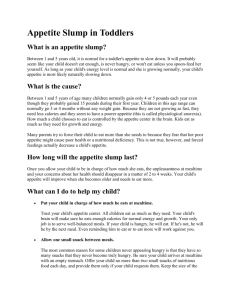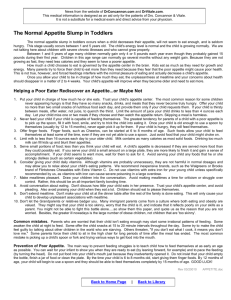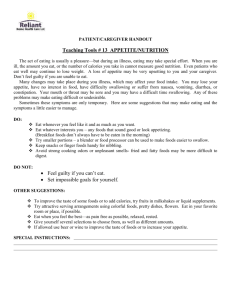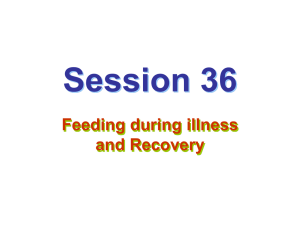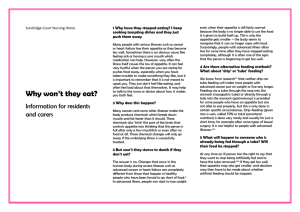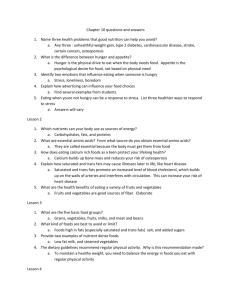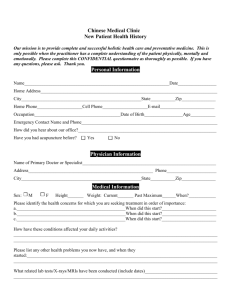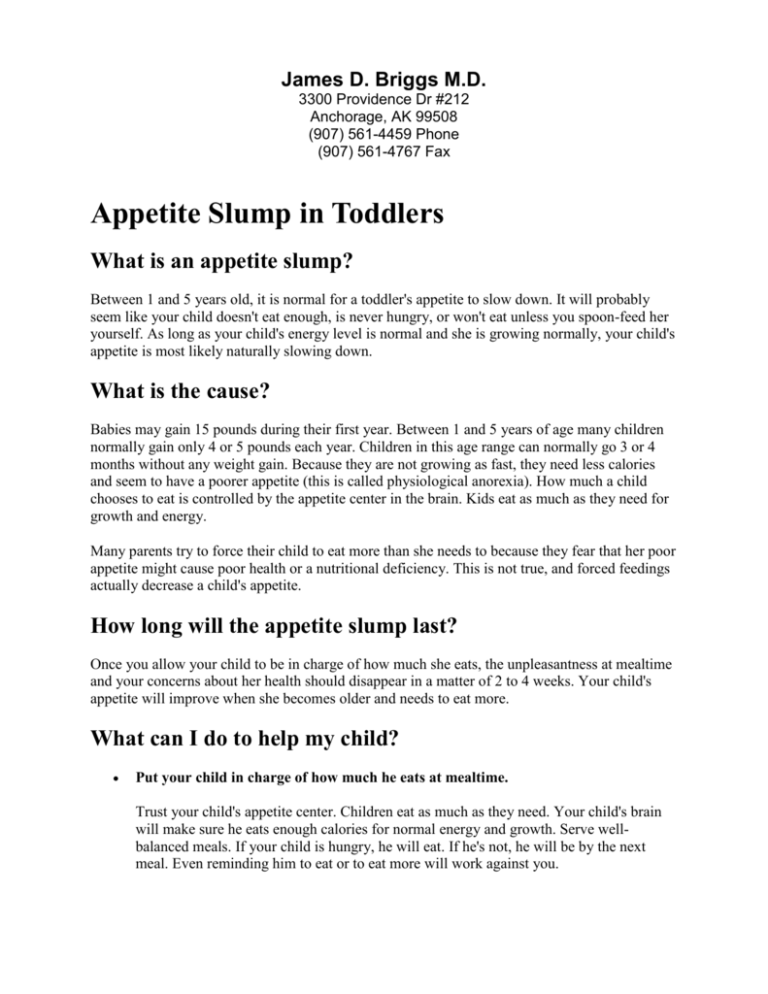
James D. Briggs M.D.
3300 Providence Dr #212
Anchorage, AK 99508
(907) 561-4459 Phone
(907) 561-4767 Fax
Appetite Slump in Toddlers
What is an appetite slump?
Between 1 and 5 years old, it is normal for a toddler's appetite to slow down. It will probably
seem like your child doesn't eat enough, is never hungry, or won't eat unless you spoon-feed her
yourself. As long as your child's energy level is normal and she is growing normally, your child's
appetite is most likely naturally slowing down.
What is the cause?
Babies may gain 15 pounds during their first year. Between 1 and 5 years of age many children
normally gain only 4 or 5 pounds each year. Children in this age range can normally go 3 or 4
months without any weight gain. Because they are not growing as fast, they need less calories
and seem to have a poorer appetite (this is called physiological anorexia). How much a child
chooses to eat is controlled by the appetite center in the brain. Kids eat as much as they need for
growth and energy.
Many parents try to force their child to eat more than she needs to because they fear that her poor
appetite might cause poor health or a nutritional deficiency. This is not true, and forced feedings
actually decrease a child's appetite.
How long will the appetite slump last?
Once you allow your child to be in charge of how much she eats, the unpleasantness at mealtime
and your concerns about her health should disappear in a matter of 2 to 4 weeks. Your child's
appetite will improve when she becomes older and needs to eat more.
What can I do to help my child?
Put your child in charge of how much he eats at mealtime.
Trust your child's appetite center. Children eat as much as they need. Your child's brain
will make sure he eats enough calories for normal energy and growth. Serve wellbalanced meals. If your child is hungry, he will eat. If he's not, he will be by the next
meal. Even reminding him to eat or to eat more will work against you.
Allow one small snack between meals.
The most common reason for some children never appearing hungry is that they have so
many snacks that they never become truly hungry. Be sure your child arrives at mealtime
with an empty stomach. Offer your child no more than two small snacks of nutritious
food each day, and provide them only if your child requests them. Keep the size of the
snack to 1/3 of what you would expect him to eat at mealtime. If your child is thirsty
between meals, offer water. It is better not to offer any juice or other sweet drinks. If your
child does drink juice, limit the amount of juice your child drinks to less than 2 ounces
each day for 1-2 year olds and less than 4 ounces for 3-6 year olds. Let your child miss
snacks if she chooses and then watch the appetite return. Even skipping an occasional
meal is harmless.
Never feed your child if he is capable of feeding himself.
Parents of a child with a poor appetite will tend to pick up the spoon, fill it with food,
smile, and try to trick the child into taking it. Once your child is old enough to use a
spoon by himself (usually 12 to 15 months), never again pick it up for him. If your child
is hungry, he will feed himself. Forced feeding is the main cause of eating power
struggles.
Offer more finger foods.
Finger foods can be started at 6 to 8 months of age. Such foods allow your child to feed
herself at least some of the time, even if she is not yet able to use a spoon.
Limit milk to less than 16 ounces each day.
Milk contains as many calories as most solid foods. Drinking too much milk or juice can
fill kids up and dull their appetites. Whole milk gets most of its calories from saturated
fat, so it is better to give reduced fat (2 %) milk, even at one year of age. Children over
two years of age may drink 1 % or skim (nonfat) milk.
Serve small portions of food--less than you think your child will eat.
A child's appetite is decreased if she is served more food than she could possibly eat. If
you serve your child a small amount on a large plate, she is more likely to finish it and
gain a sense of accomplishment. A good rule of thumb is that one “serving” of any food
is about one tablespoon per year of age—one tablespoon for a one-year old, two
tablespoons for a two-year old, etc. This is just a guideline, not a firm rule. If your child
seems to want more, wait for her to ask for it. Avoid serving your child any foods that she
strongly dislikes (such as some vegetables). However, remember that you may need to
offer a new food several times before your child decides to try it. Some toddlers will go
on “food jags”, where they will not eat certain foods, such as green vegetables, for weeks
or months. If this happens, keep offering small amounts of these foods occasionally,
without any comment, and eventually your child will start to eat them again.
Consider giving your child daily vitamins.
Although vitamins are probably unnecessary, they are not harmful in normal dosages and
may help you relax about your child's eating patterns. One vitamin that is often deficient
is vitamin D, because this normally comes from sunshine, not from food. The only good
dietary source of vitamin D is wild salmon. Milk has a little, but probably not enough. I
recommend 1,000 IU (international units) of supplemental vitamin D3 daily or 7,000 IU
once weekly. This can be given in the form of concentrated drops (500 IU or 1,000 IU in
one small drop), which can be mixed with a spoonful of food. It is also available in a
fruit-flavored liquid that contains 1,000 IU in two teaspoons (10 mL). If your child takes
a multivitamin (polyvitamin drops for toddlers or one chewable vitamin or two gummy
bears for older children), this contains 400 IU of vitamin D3, and you should then give an
extra 500 IU of vitamin D3, in addition to the multivitamin.
Make mealtimes pleasant.
Draw your children into mealtime conversation. Avoid making mealtimes a time for
criticism or struggle over control.
Avoid conversation about eating.
Don't discuss how little your child eats in her presence. Trust your child's appetite center
to look after her food needs. Also, don't praise your child for eating a lot. Children should
eat to please themselves. Do not use food treats or trips to restaurants as rewards for good
behavior! Do not use sweets as bribes to get children to eat healthy foods (“You can have
some ice cream after you eat your vegetables”) or as incentives (“If you clean your room,
you can have some candy”).
Don't extend mealtime.
Don't make your child sit at the dinner table after the rest of the family is through eating.
This will only cause your child to develop unpleasant feelings about mealtime.
Common mistakes.
Parents who are worried that their child isn't eating enough may start some irrational
patterns of feeding. Some awaken the child at night to feed her. Some offer the child
snacks at 1 hour intervals throughout the day. Others permit snacks that are larger than a
regular meal. Some try to make the child feel guilty by talking about other children in the
world who are starving. Others threaten, "If you don't eat what I cook, it means you don't
love me." Some parents force their child to sit in the high chair for long periods of time
after the meal has ended. The most common mistake is picking up a child's spoon or fork
and trying various ways to get food into her mouth.
How do I prevent feeding struggles?
The main way to prevent feeding struggles is to teach your child how to feed herself at as early
an age as possible. By the time your child is 6 to 8 months old, start giving her finger foods. By
12 months of age, your child will begin to use a spoon and she should be able to feed herself
completely by 15 months of age.
When you feed your child (before she is old enough to feed herself), you can wait for your infant
to show you when she is ready to eat (by leaning forward, for example). Let her pace the feeding
herself (for example, by turning her head). Do not put food into a child's mouth just because she
has inadvertently opened it. Do not insist that your child empty the bottle, finish a jar of baby
food, or clean the plate.
When should I call my child's healthcare provider?
Call during office hours if:
Your child is losing weight.
Your child has not gained any weight in 6 months.
Your child also has symptoms of illness (for example, diarrhea or fever).
Your child gags on or vomits some foods.
Someone is punishing your child for not eating.
Following these guidelines has not improved mealtimes in your house within 1 month.
You have other questions or concerns.
Written by B.D. Schmitt, MD, author of "Your Child's Health," Bantam Books.
Published by RelayHealth.
Last Modified: 8/13/2009
Last Reviewed: 6/15/2009
Modified by James D. Briggs, M.D. 9/7/2011
This content is reviewed periodically and is subject to change as new health information
becomes available. The information is intended to inform and educate and is not a replacement
for medical evaluation, advice, diagnosis or treatment by a healthcare professional.
© 2010 RelayHealth and/or its affiliates. All Rights Reserved.

